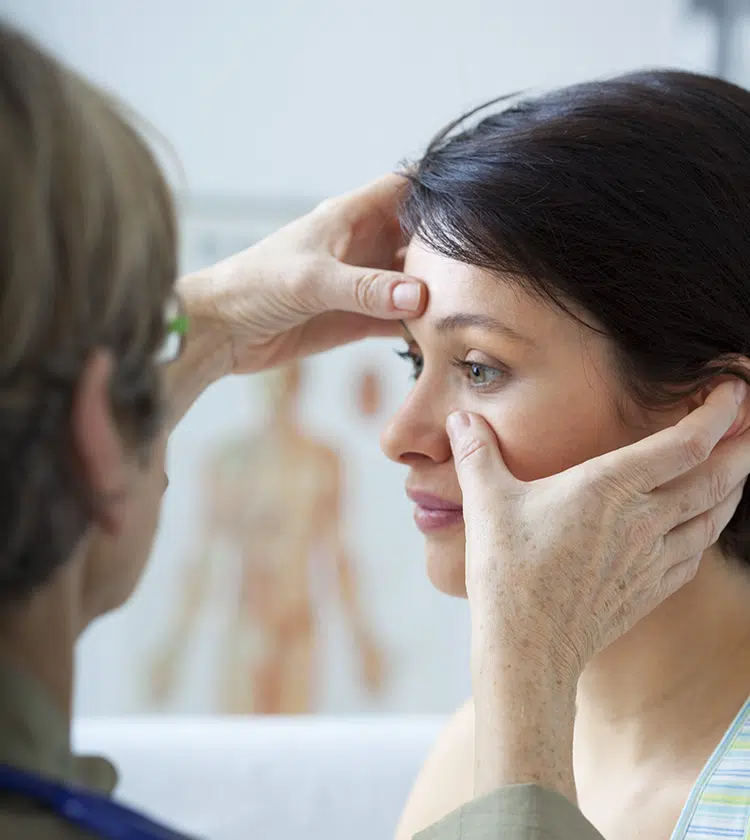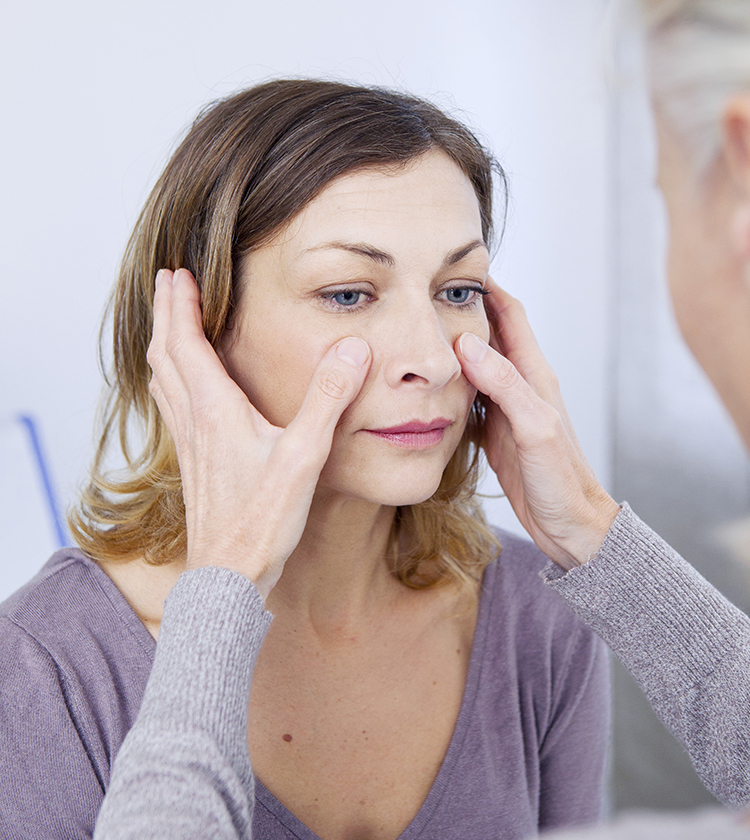
Sinus Headaches: Causes, Symptoms, Treatment & Prevention
Understanding Sinus Headaches
Sinus headaches can be painful and disruptive, affecting daily activities and overall quality of life. Many individuals suffer from these headaches without realizing they stem from sinus issues. Unlike migraines or tension headaches, sinus headaches occur due to inflammation and congestion in the sinus cavities. The pressure and swelling in these areas can cause persistent pain in the forehead, around the eyes, and even in the upper cheeks and teeth.
The information provided below and throughout this website is presented for general educational purposes only and does NOT constitute professional medical advice. This information is NOT a substitute for professional medical advice and NO material on this site is intended to be a substitute for professional medical advice. Always seek the guidance of your doctor or other qualified health professional with any questions you may have regarding a health or a medical condition. Never disregard the advice of a medical professional or delay in seeking it because of something you have read on this website.
If left untreated, sinus headaches can become chronic and are associated with sinus infections or worsening of underlying conditions. Fortunately, expert care from an experienced ENT specialist can help identify the root cause and provide effective relief. Becker ENT & Allergy offers professional and compassionate care for individuals suffering from sinus headaches, with advanced diagnostic tools and customized treatment plans.
Types of Sinus Headaches
Sinus headaches can vary based on the underlying cause and severity. While many individuals experience occasional headaches due to sinus pressure, others suffer from chronic and recurring sinus-related headaches. Understanding the different types of sinus headaches can help guide treatment and prevention strategies.
Acute Sinus Headache
This type of sinus headache occurs due to an acute sinus infection (acute sinusitis) and is usually accompanied by nasal congestion, facial pressure, and sometimes fever. It is often triggered by a viral or bacterial infection and typically lasts for a few days to a couple of weeks.
Chronic Sinus Headache
Linked to chronic sinusitis, this type of headache is characterized by ongoing or recurrent sinus inflammation lasting for weeks or even months. Individuals with chronic sinusitis may experience dull, persistent headaches accompanied by nasal congestion, postnasal drip, and facial pain.
Allergy-Induced Sinus Headache
Allergic reactions to pollen, dust mites, mold, or pet dander can lead to sinus inflammation and congestion, causing headaches. These headaches are often seasonal and occur alongside other allergy symptoms such as sneezing and itchy eyes.
Recurrent Sinus Headache
Some individuals suffer from periodic sinus headaches due to repeated sinus infections or underlying nasal conditions. Identifying and treating the root cause is crucial to reducing recurrence.

What Causes Sinus Headaches?
Sinus headaches can arise from various causes, many of which are related to sinus inflammation and obstruction of normal drainage pathways. When the sinuses become swollen, inflamed, or blocked, pressure builds up, leading to discomfort and headaches.

Symptoms of Sinus Headaches
Sinus headaches often share symptoms with other types of headaches, such as migraines and tension headaches. However, certain key features help differentiate them from other headache types.



Risk Factors for Developing Sinus Headaches
Some individuals are more prone to developing sinus headaches due to certain predispositions or lifestyle factors. Recognizing these risk factors can help in early intervention and prevention.
Sinus Headache Consultation and Diagnosis
Seeking professional medical care is essential for accurate diagnosis and effective treatment of sinus headaches. At Becker ENT & Allergy, our specialists conduct a detailed assessment to determine the cause and appropriate treatment plan.
The Consultation Process
Our specialists will ask about your headache patterns, frequency, severity, and possible triggers to better understand your condition.
Medical History Review
A thorough examination of the nasal passages, sinuses, and facial areas will help identify inflammation, congestion, or tenderness.
Physical Examination
If necessary, a CT scan or X-ray may be recommended to detect blockages, structural abnormalities, or chronic sinus infections.
Imaging Tests
If allergies are suspected, skin or blood tests may be performed to identify specific allergens contributing to sinus issues.
Allergy Testing
Using a small endoscope inserted into the nasal passages, an ENT specialist can directly visualize the sinuses and detect obstructions, polyps, or infections.
Nasal Endoscopy
After a comprehensive evaluation, our specialists will discuss your diagnosis and recommend a personalized treatment plan to relieve your symptoms and prevent recurrence.
Non-Surgical Treatment Options for Sinus Headaches
Treatment for sinus headaches depends on the underlying cause, severity, and frequency of symptoms. A comprehensive approach is often needed, combining medications, lifestyle modifications, and in some cases, surgical intervention. Our specialists at Becker ENT & Allergy create personalized treatment plans tailored to each patient’s needs, ensuring optimal relief and long-term sinus health.
Medications
For many individuals, medications can provide significant relief from sinus headaches. Treatment options include:
- Decongestants – Reduce nasal swelling and improve mucus drainage, helping to relieve pressure and headaches.
- Antihistamines – Useful for allergy-related sinus headaches by reducing allergic reactions that contribute to congestion.
- Nasal corticosteroids – Decrease inflammation in the nasal passages, preventing chronic sinus problems.
- Pain relievers – Over-the-counter or prescription pain medications can help alleviate headache discomfort.
- Antibiotics – Prescribed only if a bacterial sinus infection is present and causing persistent headaches.
Additional Non-Surgical Treatments
In addition to medications, other approaches may help reduce sinus headache severity and frequency:
- Saline nasal irrigation – Rinsing the nasal passages with a saline solution can help clear mucus and reduce inflammation.
- Hydration – Drinking plenty of fluids helps thin mucus, promoting better sinus drainage.
- Steam therapy – Inhaling steam can open the nasal passages and relieve congestion.
- Avoiding triggers – Identifying and managing triggers such as allergens or strong odors can help prevent sinus headaches.
Surgical Treatment Options for Sinus Headaches
When medications and non-surgical treatments do not provide sufficient relief, surgical options may be necessary. Surgery is typically recommended for individuals with chronic sinusitis, nasal polyps, or structural abnormalities such as a deviated septum that contribute to frequent sinus headaches.
Balloon Sinuplasty
Balloon sinuplasty is a minimally invasive procedure designed to open blocked sinus passages and restore normal drainage.
Candidates for Balloon Sinuplasty
- Patients with chronic or recurrent sinusitis
- Individuals who experience frequent sinus headaches due to persistent congestion
- Those who have not found relief from medications or other treatments
How the Procedure is Performed
- A small, flexible balloon catheter is inserted into the sinus passage.
- The balloon is gently inflated to widen the blocked sinus pathway.
- The sinus is flushed with saline solution to remove mucus and debris.
- The balloon is then deflated and removed, leaving the sinus passage open for better drainage.
Recovery and Benefits
- Minimal discomfort and a short recovery time (typically a few days)
- Significant reduction in sinus headaches and congestion
- No need for cutting or removal of tissue, making it a low-risk option
Endoscopic Sinus Surgery
Endoscopic sinus surgery is a more advanced procedure used to remove obstructions and improve sinus function.
Candidates for Endoscopic Sinus Surgery
- Patients with chronic sinus infections resistant to medication
- Individuals with nasal polyps, tumors, or severe sinus blockages
- Those with significant sinus headaches linked to anatomical obstructions
How the Procedure is Performed
- A thin, flexible endoscope with a camera is inserted into the nasal passages.
- Small instruments are used to remove polyps, scar tissue, or other obstructions.
- Sinus openings may be enlarged to allow for better mucus drainage.
Recovery and Benefits
- Recovery time is typically 1-2 weeks, with mild discomfort
- Improved breathing and reduced sinus headaches
- Long-term results with proper post-surgery care
Septoplasty
Septoplasty is a surgical procedure aimed at correcting a deviated septum to improve nasal airflow.
Candidates for Septoplasty
- Individuals with a deviated septum causing nasal obstruction and recurrent sinus headaches
- Those experiencing chronic nasal congestion and breathing difficulties
How the Procedure is Performed
- A small incision is made inside the nostril.
- The deviated septum is repositioned to allow for better airflow.
- Any obstructive bone or cartilage may be trimmed, repositioned, or removed.
Recovery and Benefits
- Recovery time is typically 1-2 weeks, with swelling gradually subsiding.
- Improved nasal airflow and breathing.
- Long-term relief from chronic nasal blockage and congestion.
Preventing of Sinus Headaches
Preventing sinus headaches involves managing risk factors and making lifestyle changes, including:
Why Choose an ENT Specialist?
Becker ENT & Allergy offers specialized care for sinus headaches with a team of board-certified experts. Our specialists use state-of-the-art diagnostic tools and tailored treatment plans to address sinus issues effectively. With multiple Philadelphia locations, expert care is accessible and convenient.
Philadelphia Locations and Contact Information
For expert sinus headache care, visit one of our Philadelphia locations. Contact us today to schedule an appointment.
Walnut Street Office
1608 Walnut St Suite 902
Philadelphia, PA 19103
Phone: (215) 929-8301
South Street Office
1740 South St Suite 401
Philadelphia, PA 19146
Phone: (215) 671-6330


